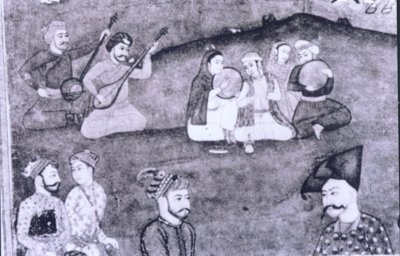Sufism and Indian Mysticism
by Dr. Jyotsna Kamat
First Online: September 01, 2006
Page Last Updated: December 07, 2024
Mysticism means direct intuitive experience of the ultimate reality, by an individual. This reality could be God or self. In the Indian context, religious freedom and mystical experience go hand-in-hand. Persons who are able to achieve, direct intuitive experience with God or Supreme spirit are greatly Venerated.
Mysticism is not allowed or recognized in Christianity, Islam and Judaism. Absolute faith in the prophets who founded these religions followed by morality are considered supreme. Those who do not accept superiority of the teachings of their prophets or 'non believers' are denied salvation, and are condemned to go to hell.
K.L. Kamat/Kamat's Potpourri
A Sufi Mystic
Colorful turban of a Sufi mystic. Bangalore, 2000
In Hinduism, salvation is possible to any person who strives hard for mukti or liberation, i.e. total freedom from sorrow and ignorance. Spiritual discipline or penance in the individualistic way or under a able guru, helps one to attain this stage. Efforts towards attaining mukti was real education in Hindu thought (sa vidya ya vimuktaye).
Though Mysticism was not recognized in Islam, many mystics appeared in India, and Mansur-Al-Haiiaj (858-922 C.E) was the greatest among them. He was born in Persia and took to wandering at a young age visiting places and ascetics. He used to have mystical experiences. He finally came to India. Islam had not taken deep roots at that time and he was greatly influenced by Hindu mysticism. On his return, he settled down in Baghdad and started preaching his new found ideas.
The most famous quote of his is 'ana'l-haqq' or 'I am the Reality'. This is similar to Hindu Vedantic principle. 'I am Brahman'.
The orthodox Muslim clergy could not swallow this 'heresy'. Hallaj was arrested, tortured and executed in a barbarous way.
But his teachings left a lasting influence. Divinity of the soul and the possibility of attaining oneness with the supreme soul was a novel concept to persons who were far above the materialistic world.
© K. L. Kamat

Another great Sufi mystic poet was Jalal-ud-Din Rumi (1207-1273 CE). He was born in eastern Persia. But his father moved out and Rumi studied at Arabic universities and became famous as a scholar. But he was fond of wandering and came in contact with dervishes or moving Sadhus, fakirs. This changed his life. He founded a religious order called the Maulavis, who practiced a whirling dance and singing to induce spiritual ecstasy. His book "Mathnavi" is considered greatest work in Islamic mysticism.
Rumi, the mystic, thought God as the only Reality. "The world was His shadow". He believed in the pre-existence of the soul, which passed through different stages, to unite finally with God. He had a good number of disciples and Sufism spread in other Islamic countries wherein music and dance found place as spiritual ways to attain intuitive communication with God.
In India, mysticism took many forms and Sufism was accepted as a natural phenomenon by many gurus and saints. Bridal mysticism was a way of attaining their beloved the God to Andal, Akkamahadevi and Mirabai. Besides Kabir, there were other Muslim saints who were venerated by Hindus and Muslims alike. Some of them were Shah Latif of Sind, Dara Shukoh (the eldest son of emperor Shah Jahan). Khwaja Muinuddin Chist, (of Ajmer) and Banda Nawaz of Gulburga. Inter-mingling of Sufism and Hindu yoga led to common faith which rose above caste system and idol worship. Purity of mind and sadhana (self-disciplined meditation) and guidance of guru became more important, than study of scriptures, in both religions.
![]()
See Also:
- Bridal Mysticism
- Visitor's Log at Gersoppa Falls -- Amma's Column on Jan 02, 2010

